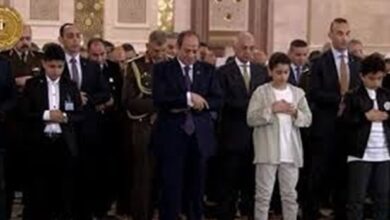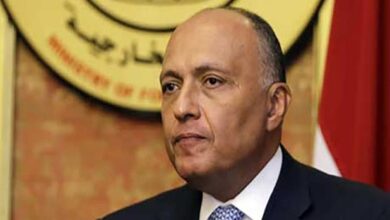The military's recently proposed timetable for the handover of power to an elected civilian government has exacerbated fears of further political turmoil and raised questions about whether or not the generals are eyeing the presidency.
On Saturday, Egypt’s Chief of Staff of the Armed Forces, Sami Anan, met with the leaders of 13 political parties and put forward a detailed schedule for the remaining tasks yet to be accomplished during the transitional period.
According to this blueprint, parliamentary elections will begin in late November. The parliament’s two houses will convene in late March or early April to elect a constituent assembly for the promulgation of Egypt’s first post-Hosni Mubarak constitution. Within six months, the new constitution is to be drafted and then set to a public referendum. After a majority of voters approves the text, the presidential elections will be held within two months. Finally, the military will retreat.
Under this plan, the generals are expected to remain in charge until the end of 2012 at the earliest, which contradicts their initial pledges.
Shortly after Mubarak’s depature in February, the Supreme Council of the Armed Forces announced that it would return to the barracks within six months after presidential and parliamentary elections. Initially, civilians were expected to draft the new constitution after both elections.
This plan changed several times over the months, until Anan unveiled the most recent timetable this weekend. For some skeptics, the military is deliberately stretching the transitional period in order to prepare the ground for one of the generals to run for president.
“It seems that the military has its own candidate,” says Ammar Ali Hassan, political analyst and columnist. “It [the military] is waiting for the ripe moment when public opinion is willing to accept the idea of having a presidential candidate who belongs to the military.”
In the meantime, the SCAF seeks to undermine civilian politicians in the voters’ eyes and “drain” them with “fake” ideological fights over the secular-versus-religious identity of the state, he added.
SCAF head Field Marshall Hussein Tantawi dismissed on Wednesday suggestions that the military would field a candidate. “Those are rumors,” Tantawi said.
But fears of the SCAF fielding its own candidate were exacerbated last month after Tantawi was suddenly seen walking in a Cairo street wearing civilian clothes. Tantawi, who had always kept a low profile since the fall of Mubarak, was followed by television cameras on that day and filmed while shaking hands with civilians.
This well-choreographed publicity stunt raised suspicions that the 76-year-old general might be interested in the presidency and seeks to buy time until he establishes enough popularity. Such doubts are being reinforced on a daily basis by the state-owned press, which has given Tantawi-related news and pictures prominence on its front page.
For their part, most potential presidential candidates, except Mohamed ElBaradei, have expressed their opposition to the SCAF's proposed schedule, warning that prolonging the transitional period might perpetuate instability.
These nominees, who have recently formed a coalition to put forward a common vision for the transitional period, say the presidential poll should be held by April 2012, right after the parliament is formed. At that point, the military can return to the barracks and let civilians draft the constitution on their own, they say.
In an interview with the talkshow "al-Ashera Masa’an" (10 PM), Islamist presidential hopeful Abdel Moneim Abouel Fotouh said: “We do not want to end the transitional period because X or Y can’t wait to become president… but because the transitional period poses a threat to the nation. It threatens the economy and public order.”
“We want the military to go back to its natural place,” Abouel Fotouh said earlier, contending that the military should not be ruling while the new constitution is being developed.
From a legal standpoint, the president cannot be elected before the new constitution is endorsed, according to Tahani al-Gebali, Vice-President of Egypt’s Supreme Constitutional Court.
A constitution laying out the authorities of the president and specifying whether Egypt will have a presidential or a parliamentary system should come first, said al-Gebali.
Even the 62-article interim Constitutional Declaration, which the SCAF issued in March to serve as Egypt’s temporary constitution, does not specify such functions, according to al-Gebali. By virtue of this declaration, the SCAF has assumed legislative and executive functions until the parliament and the president are elected.
By the same token, how can the parliament be elected before the constitution? For Tahani, this is a bump in Egypt’s transitional legal road.
“The functions of this parliament are not well specified in the constitutional declaration either,” said al-Gebali. “We know the parliament will be in charge of making legislation, but how is it going to monitor the government? Is it going to be in charge of forming the cabinet? Will the cabinet be formed by the party that wins the majority, or is the SCAF going to appoint the new cabinet?”
Several observers have raised questions about the authorities granted to the new parliament until the new constitution is voted in. In his column in Al-Shorouk daily, political science professor Mostafa Kamel el-Sayed argued that the new parliament will have no real power to oversee the cabinet’s performance.
“Of course, the members of parliament will try to exercise some monitoring functions over the cabinet … but the new cabinet will try to evade such oversight by arguing that there are no clear constitutional articles that give [the parliament] such a role. The cabinet can also ignore it [the People’s Assembly] because the latter won’t have the power to sack it," wrote Sayed on Monday.
“Things will end up in continuous tensions between the government and the People’s Assembly, and this is the last thing one would wish for Egypt under these critical circumstances,” he added.
Hossam Issa, law professor at Ain Shams University raised other concerns about the parliament.
“After the new constitution is drafted, will the same parliament stay in place or shall we elect a new one?“ he wondered.
“The logic says that we should hold new parliamentary elections then… It is also very possible that the new constitution abolishes the Shura Council [the parliament’s upper house]; it has no function,” added Issa.
For Issa, all these shortcomings are the result of not taking the right path from the beginning.
“We are paying the price of all the mess that both the SCAF and the Muslim Brotherhood caused us when they refused to issue a constitution first,” concluded Issa.
Shortly after the fall of Mubarak, the military appointed a legal commission to suggest a set of modifications to the old constitution rather than lay out a blueprint for a new one entirely. The commission came up with eight amendments that primarily eased the restrictions on eligibility for the presidency, ensured judicial oversight of polls, and obliged the new parliament to elect a constituent assembly that would write a new constitution.
According to this path, both presidential and parliamentary elections should be held before the new constitution is drafted.
Back then, most secular forces and legal experts opposed the plan, arguing that a new constitution should be drafted first, before elections. They contended that the opposite scenario would lead to many legal and constitutional bumps that might culminate in political chaos. They also expressed fears that Islamists might win a sweeping majority in the new parliament and hence monopolize the drafting of the new constitution.
Islamists threw their full backing behind the military's plan and insisted that the parliamentary elections should be held before the constitution is drafted. On 19 March, the army held a referendum on that plan, and to the secularists’ misfortune, more than 70 percent of Egyptians voted in favor of holding elections first.




